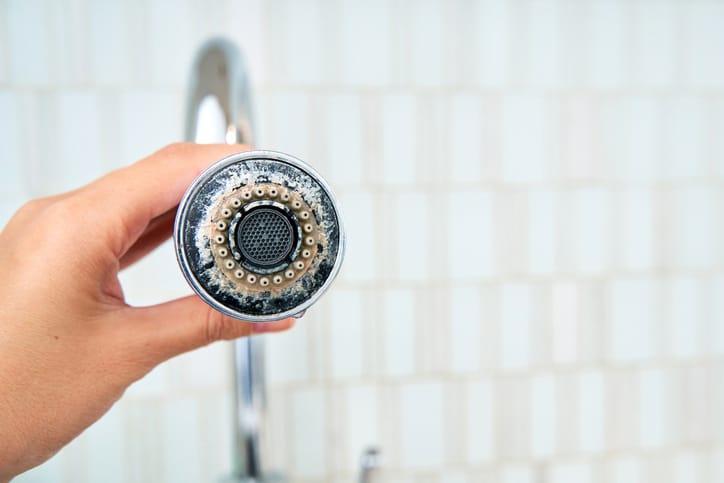Understanding Hard Water in North Texas—and How to Protect Your Home’s Plumbing
If you live in North Texas, you’ve probably heard the term hard water before. Maybe you’ve noticed soap that doesn’t lather well, cloudy glassware from the dishwasher, or a stubborn ring of residue around your faucets and fixtures. Those are all telltale signs—and they point to a bigger issue that could be silently damaging your home’s plumbing system over time.
In this post, we’ll explore what hard water is, how it impacts homes in areas like Fort Worth, Aledo, Weatherford, and surrounding North Texas communities, and how a whole-home water filtration system can be the solution your pipes—and family—have been waiting for.
Schedule ServiceAledo - 817-438-6142
Fort Worth - 817-438-6955

If you live in North Texas, you’ve probably heard the term hard water before. Maybe you’ve noticed soap that doesn’t lather well, cloudy glassware from the dishwasher, or a stubborn ring of residue around your faucets and fixtures. Those are all telltale signs—and they point to a bigger issue that could be silently damaging your home’s plumbing system over time.
In this post, we’ll explore what hard water is, how it impacts homes in areas like Fort Worth, Aledo, Weatherford, and surrounding North Texas communities, and how a whole-home water filtration system can be the solution your pipes—and family—have been waiting for.
What Is Hard Water?
Hard water contains elevated levels of dissolved minerals, primarily calcium and magnesium. These minerals occur naturally as water moves through soil and rock. While not harmful to your health, hard water can have a major impact on your plumbing system, appliances, and overall water quality.
The U.S. Geological Survey classifies water hardness on a scale based on the concentration of calcium carbonate:
Soft water: 0–60 mg/L
Moderately hard water: 61–120 mg/L
Hard water: 121–180 mg/L
Very hard water: 181+ mg/L
In North Texas, including cities like Granbury, Azle, and Benbrook, water is typically classified as hard to very hard. Municipal water supplies pull from sources rich in these minerals, and unless you have a filtration or softening system in place, that water flows straight into your home’s plumbing system.
How Hard Water Affects Your Plumbing
Over time, the high mineral content in hard water starts to accumulate in your pipes, fixtures, and appliances. This buildup is called scale, and while it might sound harmless, it can lead to expensive and inconvenient plumbing problems. Here’s how:
1. Clogged and Narrowed Pipes
Scale doesn’t just coat the inside of your pipes—it can actually reduce water flow, increase pressure, and lead to clogs. This is especially problematic in older homes or in areas with already low water pressure.
2. Water Heater Damage
Your water heater is one of the most vulnerable appliances in your home when it comes to hard water. As scale builds up on the heating elements and inside the tank, it reduces efficiency and forces your system to work harder to heat water. This can result in:
Higher energy bills
Lukewarm or insufficient hot water
Premature system failure
If you’ve recently needed a water heater flush or replacement in Fort Worth or Aledo, hard water is likely part of the reason.
3. Leaky Fixtures and Faucet Damage
Scale buildup also affects your fixtures. You might notice crusty white residue around faucets, showerheads, and toilet tanks. Beyond the aesthetic issues, this buildup can wear down seals and gaskets, leading to leaks and reduced fixture lifespan.
4. Soap Scum & Skin Irritation
Hard water also reacts poorly with soap and detergent, leaving behind a filmy residue on your skin, hair, and laundry. This not only makes cleaning more difficult but can also cause skin dryness and irritation for sensitive individuals.
Why a Whole-Home Water Filtration System is the Answer
If you’re dealing with any of the issues above—or just tired of battling stubborn soap scum—it’s time to consider a whole-home water filtration system. Here’s why it’s a smart investment for North Texas homeowners:
✅ 1. Protects Your Pipes and Appliances
By removing excess minerals before they enter your plumbing system, a filtration system prevents scale buildup, extends the life of your water heater, dishwasher, washing machine, and reduces the need for frequent repairs or early replacements.
✅ 2. Improves Water Quality Throughout Your Home
Unlike a single faucet filter or pitcher, a whole-home system treats water at the source. That means every tap in your home delivers filtered water—whether you’re cooking, showering, or brushing your teeth.
✅ 3. Saves Money in the Long Run
While there’s an upfront cost to installation, you’ll save big over time through:
Lower energy bills
Fewer plumbing repairs
Longer appliance lifespan
Less cleaning product and detergent use
✅ 4. Better for Your Family
Filtered water isn’t just better for your plumbing—it’s better for your family. You’ll notice softer skin and hair, brighter laundry, and cleaner dishes. And for those with sensitive skin or health conditions, it’s an easy way to create a more comfortable, healthier home.
Why Choose S.W.A.T. Plumbing?
At S.W.A.T. Plumbing, we’re proud to serve families across North Texas as the first responders to plumbing disasters—but we also believe in preventing those disasters before they happen. We’re a local, family-owned and operated business, and we know exactly what kind of water challenges our community faces.
Our team of licensed professionals can assess your home’s needs, recommend the right whole-home filtration system, and install it quickly and efficiently. We’ll walk you through every step and make sure your system is working perfectly from day one.
Ready to Defend Your Home from Hard Water?
If you live in Granbury, Weatherford, Azle, Benbrook, Fort Worth, or Aledo, TX, now is the time to take control of your water quality. Contact us today for a free consultation or to learn more about how a whole-home water filtration system can protect your home, save you money, and improve your everyday life.








